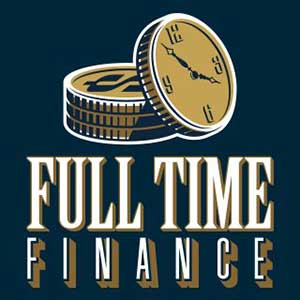
Know Your Blogger Series
Full Time Finance

Full Time Finance started in September of 2016. The goal was to write for higher-income corporate professionals and those hoping to become one. I love reading and writing about financial topics.
So many blogs in our space focus on getting to retirement or out of debt. I try to write about enjoying the ride as a corporate professional in a somewhat higher income role.
Check out our Q&A with Full Time Finance here.
So many blogs in our space focus on getting to retirement or out of debt. I try to write about enjoying the ride as a corporate professional in a somewhat higher income role.
Check out our Q&A with Full Time Finance here.
Come read about Full Time Finance, a blog about helping you succeed with your finances as a corporate professional.
Each week at Personal Finance Blogs, we publish interviews from amazing bloggers from the personal finance space. This week, we are featuring the blog, Full Time Finance.
During these weekly features, we are hoping to provide a way for you to interact and learn more about different blogs in the personal finance space.
Below, you can read more about the story behind Full Time Finance, learn about the author, and learn personal finance tips from Full Time Finance to help you improve your financial situation.
A big thanks for Full Time Finance for this interview! Now, we will turn it over to the author for this interview.
During these weekly features, we are hoping to provide a way for you to interact and learn more about different blogs in the personal finance space.
Below, you can read more about the story behind Full Time Finance, learn about the author, and learn personal finance tips from Full Time Finance to help you improve your financial situation.
A big thanks for Full Time Finance for this interview! Now, we will turn it over to the author for this interview.
Tell us about Full Time Finance
Full Time Finance started in September of 2016. The goal was to write for higher income corporate professionals and those hoping to become one. I love reading and writing about financial topics. My wife however hates the topic. As such we decided the site would be a great outlet for me. She came up with the name actually. Basically it is the combination of working full time in the corporate world while managing one’s finances.
What makes you and your blog unique?
So many in our space focus on getting to retirement or out of debt. I try to write about enjoying the ride as a corporate professional in a somewhat higher income role. The middle step in life where you look for optimization and/or how to get to that middle step. In addition I sprinkle in some stories about our experiences as foster care parents.
What does “being good with your personal finances” mean to you?
The number one most important thing for your personal finances is to define your goal. Once you decide a direction take definitive action to hit those goals. That’s it. But so many people either never define their goals, are afraid to take the first step, or don’t stick with the action.
The actions and goals actually are unique to the individual. Which ones chosen in many way’s matter less than that you plan them out and take action consistently. Not everyone wants to be the next Bill Gates or Retire at 30. But everyone needs their financial house in order in some way to live their desired financial life without finance strife.
What are some habits you practice to keep your personal finances in order?
Simplify, Automate, Plan.
Studies show that the more complex you make things, the harder it is to make decisions. They also show that making decisions in the heat of emotion leads to worse outcomes. I’ve taken this information, which I have also found true about myself, and applied it to my personal finance habits.
Wherever possible I simplify things. As few accounts as possible. I automate the saving in those accounts which reduces questions around budgeting or investment in the heat of the moment. And finally, I plan ahead for down turns and other major actions so I can adapt to changes without having to make sudden emotional direction changes.
What’s an area of your life which has benefited from improving your personal finances? Have there been any areas of your life which have suffered?
In general, I practice a balance between finances and other aspects of our life. As such I cannot say our life has suffered. I will say the main benefit is a decrease in anxiety.
I grew up in a lower middle class household, always living paycheck to paycheck. I felt the anxiety and strife that caused. Part of what has driven me to where I am today is avoiding having those feelings in scenarios in my adult life and that of my family. I’m happy to say, these days finances are not a source of anxiety for our household. I guess you could say that financial acumen is what removed my suffering.
In your opinion, what’s better? Renting a place or buying a house to live?
Like everything else in life it depends on your goals and situation. If you plan to live in the same area for the next 10 years, or want to customize a place to your liking, then buying wins hands down. If you want to move around regularly, and have someone else responsible for home upkeep, then rent. For us, we currently prefer customization and 10 year plus stays. But I could see that changing depending on my phase of life.
In your opinion, what should you do first? Pay down debt, or invest?
I believe the answer is both. All investors should have an asset allocation plan defining what they are willing to invest in both low risk and high risk investments. High risks investments drive your return while low risk investments keep you from doing something stupid like selling low.
Debt pay down is in essence a low risk investment. I.E. it does not matter what the market does, the debt you pay off still increases your net worth. If you have liquidity issues handled, then you should pay down debt in lieu of buying additional low risk investments. Doing so, at the same proportion you’d say buy bonds, captures both the security of paying off debt with the benefit of still increasing the risky investment elsewhere. Doing so aligned with your AA aligns your choice with your risk tolerance.
In your opinion, what’s better? Focusing on increasing your income, or focusing on decreasing your expenses?
As with anything else it depends on where you are in life. If you make a lower income or are just starting out then increasing income should absolutely be your focus. If you are later in your career, or near the top of your potential pay, the answer is decreasing your expenses.
The example I give is when I was 25. I put maybe 8-10% of my income into savings. As I increased my income and got married we kept our spending relatively similar to then. These days that 10% is more like 50%. But my income is nearly 3x what it was 14 years ago. Conversely, I’d be a fool to expect that my income will be 3x what it is today 14 years from now. Especially not if I’m unwilling to abandon my work life balance to obtain that number. As such today my focus needs to be on continuing to keep my expenses in check.
What is your favorite investment class and why? (stocks, private business, bonds, real estate, crypto, precious metals, etc.)
I am not really a fan of precious metals or crypto. I tend to prefer investments that have some sort of income component based on the belief that other things are speculative in nature. I currently actively invest in stocks and bonds.
Conceptually, I prefer bonds. I have done academic research on the subject and really understand the fundamentals. But mathematically I maintain an 80-20 split stocks to bonds. Having sufficient risky assets in my portfolio makes sense at my age and investing stage.
Recently I have begun experimenting with real estate investing. Our percent real estate, beyond publicly traded REITS (included in stocks) is currently a rounding error. This is not my area of expertise so I am proceeding with caution.
While I have interest in private business investing, my time is currently limited so only passive investments really work for me at this time.
So I guess you could say where it fits my lifestyle I prefer to spread our investments around.
Do you have any financial mistakes you’d like to share, and how have you grown from these mistakes to improve your personal finances?
When I first started investing I did so via individual stocks. This was during the Dotcom Bubble so everyone thought they were going to retire and be a day trader. My first stock I purchased was Nvidia, during the IPO. I was 17 and used almost all $1K of my summer earnings. The stock shot up about 10 dollars a share and I sold.
I invested the earnings in a company called Inktomi. A search engine company, they were selling at the time for $15 a share. Less than a year later Inktomi was bought by Yahoo, for less than $1 a share. The dot-com crash has arrived.
I lost all my gains and all my original investment. I was left with pocket change. Had I stayed with Nvidia that money would be worth nearly $115K as of this writing. The key learning? Even if you are right once by buying the right stock, you have to be right twice by selling that stock at the right time. The data shows no small investor does that consistently so index funds are the better investment.
Why do you believe learning about money and caring about personal finance is important?
Money is the one universal topic. No matter if you want to be rich, retire, or even just go to work every day, you still need money to get the things you want. Removing the anxiety around money by learning about how to manage it likely means the difference between achieving your goals in life, and not.
It’s very easy to sabotage your dreams with poor personal finance habits and lack of knowledge. Resolving any potential gap should be everyone’s priority. No one knows what tomorrow will bring. Personal finance knowledge brings a layer of protection against that surprise that can be achieve no where else.
How You Can Contact Full Time Finance for More Information
You can learn more about Full Time Finance at https://www.fulltimefinance.com, and follow them on Twitter at @fulltimefinance.
Thank you for reading this interview, and thank you, Full Time Finance, for providing us with some great personal finance tips!


